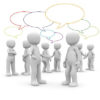Beyond the dead, and the imprint they leave on collective memory, we have what could be called the spirits. What would later be called the gods. Every trend in human behaviour, every trend in animal behaviour, in living behaviour in any form, existed before those organisms themselves emerged. The reason you are capable of feeling joyful or sad or angry or fearful, is because the mechanism or information existed in order for those processes to take shape in your brain. The chemistry and energy had to be there, and had to be inclined to move in such a way that these things would come together to give rise to a fear reaction, let’s say.
So let’s look at the “spirit” joy. It’s much more fun than many of the others. From the very beginning of life joy has been playing a part on the formation and continuance of life. Drawing organisms to food, drawing them to places of safety, drawing them to each other and to the company of other organisms they could comfortable cohabit with. Leading to both symbiosis and symbiogenesis, as well as meta-symbiotic reaction. Traits like human biophilia. Irregardless of what you profess to feel or think, your body will respond positively to being in the presence of plants and non threatening animals, and it will shows signs of distress when in a sterile or “barren” environment.
This rule of joy preceded anything we imagine to be consciousness, and was part of the foundation that would lead to the structure we call our own consciousness, as well as that of other plants and animals around us, even bacteria with their quorum sensing. They don’t get happy until a headcount tells them they have a shot at achieving their goal.
“The peaceable kingdom.”
So if this process isn’t itself conscious then how can we be? Can we be if it isn’t?
You are saying it is and we are? I agree with that.
Considering its wide spread range of manifestation and influence, as well as its deep roots in the most fundamental level of reality, what could you call this spirit other than a god? We play out its games. We smile its smiles, in a sense, though in fact it’s not so seamless as that.
“In its image”? Yes.
The gap remains and it exists for a reason. So is their anything else in the informational facet of collective memory I should cover? Besides the dead, spirits, and the gods?
Is this what Jung meant by “collective unconscious”? It is perhaps what he was intuiting as he began exploring it.
He had some very powerful visions… including visions of Biblical characters, whom he then spoke with. Indeed, I consider him to have been a very successful explorer, even if his application was limited.
Your thoughts are welcome. Be well friends.
Travis Saunders
Dragon Intuitive
~science,mysticism,spirituality~



Leave a Reply